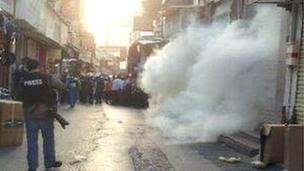Bahrain: Tear gas and stun grenades fired as protests erupt
- Published

Police have blocked major roads and are using tear gas and stun grenades against anti-government protesters in the Bahraini capital, Manama.
Protesters had responded to a call by opposition parties to march in the city.
Hundreds of youths had taken to the streets of the old market district of Manama, chanting "no dialogue with killers", an opposition source said.
The Gulf island nation has been wracked by violence for the past two years.
The Interior Ministry had earlier refused permission for the march, tweeting "It is illegal to take part in the rally and action will be taken against violators"
The call to demonstrate came despite the opposition's agreement to enter into talks with the government aimed at resolving a political impasse that has seriously damaged Bahrain's economy and led to hundreds of arrests.
A spokesman for al Wefaq, the leading opposition party, told the BBC: "Agreeing to dialogue doesn't mean that we stop our protests."
He added: "The government says that the rally is illegal, we don't believe it is. We have the right to protest peacefully in Manama."
On Sunday, the opposition had agreed to enter into talks with the government, but stressed they must be "meaningful."
Khalil al-Marzook, of Wefaq, told the BBC on Monday that the movement was "ready to partner with the ruling family and the community to find solutions".
But he added: "We need to be assured that the process is credible, we need detail about how agreement will be reached, where it will go and how the people will ratify it."
On 14 February 2011, peaceful protesters took over an iconic Bahraini monument, Pearl Roundabout. Three days later security forces cleared the site using tear gas, batons and birdshot.
At least two protesters died and hundreds were injured.
As violence escalated 35 people, including five police officers, were killed, hundreds more were hurt and thousands jailed in February and March 2011.
The vast majority were Shia Muslims in a country ruled by a minority Sunni royal family
Since then, opposition and human rights activists say another 45 people have been killed, a figure which the government disputes.
In October last year two policemen died of injuries sustained during clashes with protesters in villages outside the capital, Manama.
Thirteen activists and politicians including the leader of the secular Waad party, Ibrahim Sharif, remain in jail, convicted and in some cases given life sentences on evidence that is widely accepted to have been obtained under torture.
Street protests and gatherings are illegal and human rights defenders are routinely detained for activities that include tweeting criticism of the king and his government.